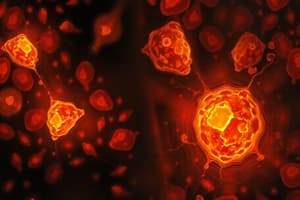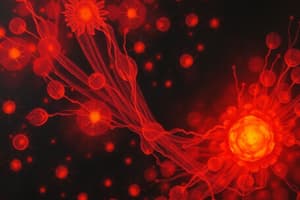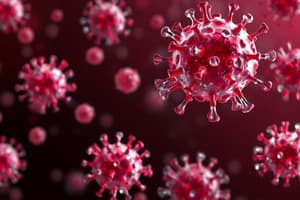Podcast
Questions and Answers
Activation signals for T cells are transmitted through the BCR complex.
Activation signals for T cells are transmitted through the BCR complex.
False (B)
CD4 and CD8 are examples of coreceptors involved in T cell activation signals.
CD4 and CD8 are examples of coreceptors involved in T cell activation signals.
True (A)
CD19 and CD21 are examples of coreceptors involved in B cell activation signals.
CD19 and CD21 are examples of coreceptors involved in B cell activation signals.
True (A)
The signaling events initiated by BCR binding lead to T cell proliferation.
The signaling events initiated by BCR binding lead to T cell proliferation.
The maturation and activation of lymphocytes rely on the detection of non-specific signals through receptors.
The maturation and activation of lymphocytes rely on the detection of non-specific signals through receptors.
Phosphorylation cascades, activation of transcription factors, and regulation of gene expression are involved in the immune response.
Phosphorylation cascades, activation of transcription factors, and regulation of gene expression are involved in the immune response.
During T cell maturation, precursor cells migrate to the bone marrow.
During T cell maturation, precursor cells migrate to the bone marrow.
B cell maturation involves interactions between developing B cells and stromal cells in the thymus microenvironment.
B cell maturation involves interactions between developing B cells and stromal cells in the thymus microenvironment.
Maturation signals for T cells are mediated by interactions between thymocytes and stromal cells expressing bone marrow epithelial cell markers.
Maturation signals for T cells are mediated by interactions between thymocytes and stromal cells expressing bone marrow epithelial cell markers.
Lymphocyte activation is the process by which immature lymphocytes become functionally activated.
Lymphocyte activation is the process by which immature lymphocytes become functionally activated.
T cell activation involves recognition of lipopolysaccharide antigens presented by antigen-presenting cells.
T cell activation involves recognition of lipopolysaccharide antigens presented by antigen-presenting cells.
BCR-initiated signaling pathways involve diverse B cell receptors recognizing a wide range of antigens.
BCR-initiated signaling pathways involve diverse B cell receptors recognizing a wide range of antigens.
NF-κB and AP-1 are transcription factors involved in the maturation of T cells.
NF-κB and AP-1 are transcription factors involved in the maturation of T cells.
The BCR-initiated signal pathway includes the activation of kinases and phosphorylation of ITIMs.
The BCR-initiated signal pathway includes the activation of kinases and phosphorylation of ITIMs.
Lymphocyte maturation is the process by which mature lymphocytes develop into immature, non-functional cells.
Lymphocyte maturation is the process by which mature lymphocytes develop into immature, non-functional cells.
Cytokines, cell surface receptors, and proteins involved in antibody production are not expressed in response to activated transcription factors.
Cytokines, cell surface receptors, and proteins involved in antibody production are not expressed in response to activated transcription factors.
Signaling pathways involved in the maturation and activation of lymphocytes respond to generic molecular cues.
Signaling pathways involved in the maturation and activation of lymphocytes respond to generic molecular cues.
Formation of the immune synapse involves the binding of antigens to T cells.
Formation of the immune synapse involves the binding of antigens to T cells.
Study Notes
T Cell Activation
- Activation signals for T cells are transmitted through the BCR complex
- CD4 and CD8 are coreceptors involved in T cell activation signals
- Signaling events initiated by BCR binding lead to T cell proliferation
- T cell activation involves recognition of lipopolysaccharide antigens presented by antigen-presenting cells
- Formation of the immune synapse involves the binding of antigens to T cells
B Cell Activation
- CD19 and CD21 are coreceptors involved in B cell activation signals
- BCR-initiated signaling pathways involve diverse B cell receptors recognizing a wide range of antigens
- The BCR-initiated signal pathway includes the activation of kinases and phosphorylation of ITIMs
Lymphocyte Maturation
- Maturation and activation of lymphocytes rely on the detection of non-specific signals through receptors
- During T cell maturation, precursor cells migrate to the bone marrow
- B cell maturation involves interactions between developing B cells and stromal cells in the thymus microenvironment
- Maturation signals for T cells are mediated by interactions between thymocytes and stromal cells expressing bone marrow epithelial cell markers
Transcription Factors and Signaling Pathways
- NF-κB and AP-1 are transcription factors involved in the maturation of T cells
- Signaling pathways involved in the maturation and activation of lymphocytes respond to generic molecular cues
- Phosphorylation cascades, activation of transcription factors, and regulation of gene expression are involved in the immune response
Studying That Suits You
Use AI to generate personalized quizzes and flashcards to suit your learning preferences.
Related Documents
Description
Learn about the process of B cell activation and the detection of activation signals in the immune system. Understand how BCR binding to antigens leads to signaling events and how T cell activation signals are transmitted through specific receptors and molecules.




![Lecture 06: T-cells and B-cell activation [MCQ 2]](https://assets.quizgecko.com/cdn-cgi/image/width=300,height=200,fit=crop,quality=75,format=webp/quiz/3a994686d8bf59d60d02fc2aa264f493.jpg)